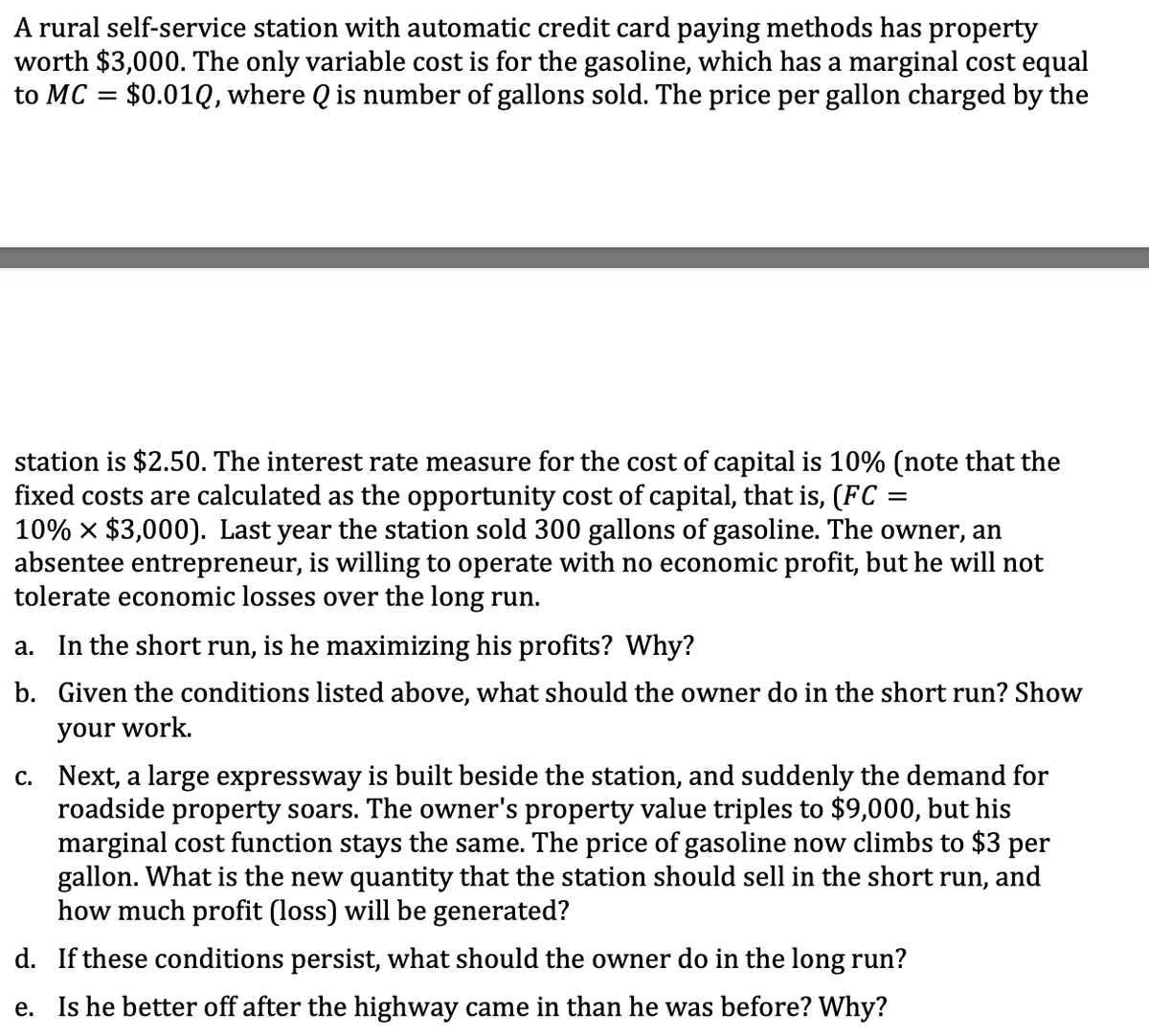a. In the short run, is he maximizing his profits? Why? b. Given the conditions listed above, what should the owner do in the short run? Show your work. c. Next, a large expressway is built beside the station, and suddenly the demand for roadside property soars. The owner's property value triples to $9,000, but his marginal cost function stays the same. The price of gasoline now climbs to $3 per gallon. What is the new quantity that the station should sell in the short run, how much profit (loss) will be generated? and
a. In the short run, is he maximizing his profits? Why? b. Given the conditions listed above, what should the owner do in the short run? Show your work. c. Next, a large expressway is built beside the station, and suddenly the demand for roadside property soars. The owner's property value triples to $9,000, but his marginal cost function stays the same. The price of gasoline now climbs to $3 per gallon. What is the new quantity that the station should sell in the short run, how much profit (loss) will be generated? and
Managerial Economics: A Problem Solving Approach
5th Edition
ISBN:9781337106665
Author:Luke M. Froeb, Brian T. McCann, Michael R. Ward, Mike Shor
Publisher:Luke M. Froeb, Brian T. McCann, Michael R. Ward, Mike Shor
Chapter1: Introduction: What This Book Is About
Section: Chapter Questions
Problem 1.1IP
Related questions
Question

Transcribed Image Text:A rural self-service station with automatic credit card paying methods has property
worth $3,000. The only variable cost is for the gasoline, which has a marginal cost equal
to MC = $0.01Q, where Q is number of gallons sold. The price per gallon charged by the
station is $2.50. The interest rate measure for the cost of capital is 10% (note that the
fixed costs are calculated as the opportunity cost of capital, that is, (FC =
10% x $3,000). Last year the station sold 300 gallons of gasoline. The owner, an
absentee entrepreneur, is willing to operate with no economic profit, but he will not
tolerate economic losses over the long run.
a. In the short run, is he maximizing his profits? Why?
b. Given the conditions listed above, what should the owner do in the short run? Show
your work.
c. Next, a large expressway is built beside the station, and suddenly the demand for
roadside property soars. The owner's property value triples to $9,000, but his
marginal cost function stays the same. The price of gasoline now climbs to $3 per
gallon. What is the new quantity that the station should sell in the short run, and
how much profit (loss) will be generated?
d. If these conditions persist, what should the owner do in the long run?
e. Is he better off after the highway came in than he was before? Why?
Expert Solution
This question has been solved!
Explore an expertly crafted, step-by-step solution for a thorough understanding of key concepts.
Step by step
Solved in 2 steps

Knowledge Booster
Learn more about
Need a deep-dive on the concept behind this application? Look no further. Learn more about this topic, economics and related others by exploring similar questions and additional content below.Recommended textbooks for you

Managerial Economics: A Problem Solving Approach
Economics
ISBN:
9781337106665
Author:
Luke M. Froeb, Brian T. McCann, Michael R. Ward, Mike Shor
Publisher:
Cengage Learning

Managerial Economics: Applications, Strategies an…
Economics
ISBN:
9781305506381
Author:
James R. McGuigan, R. Charles Moyer, Frederick H.deB. Harris
Publisher:
Cengage Learning


Managerial Economics: A Problem Solving Approach
Economics
ISBN:
9781337106665
Author:
Luke M. Froeb, Brian T. McCann, Michael R. Ward, Mike Shor
Publisher:
Cengage Learning

Managerial Economics: Applications, Strategies an…
Economics
ISBN:
9781305506381
Author:
James R. McGuigan, R. Charles Moyer, Frederick H.deB. Harris
Publisher:
Cengage Learning
